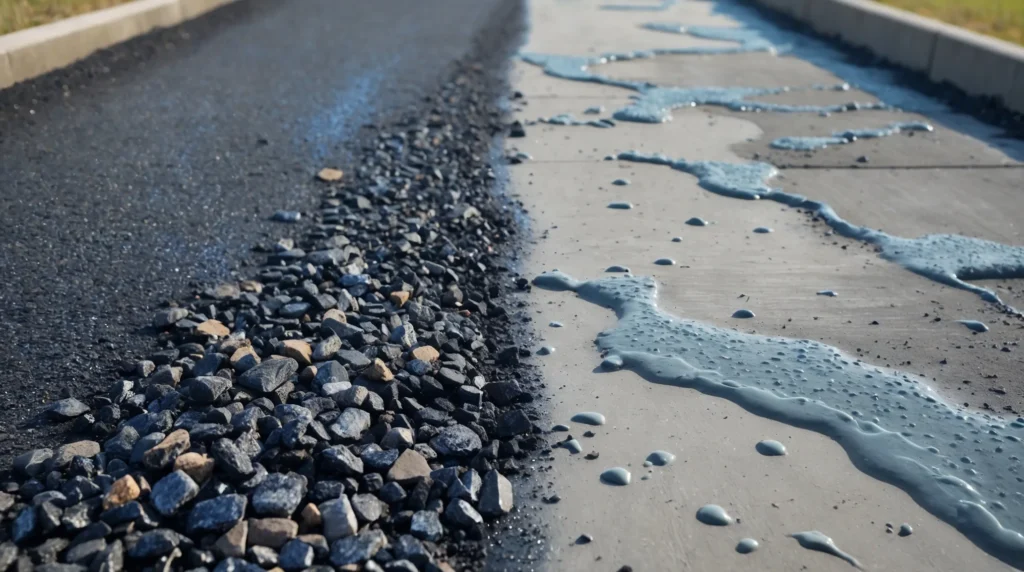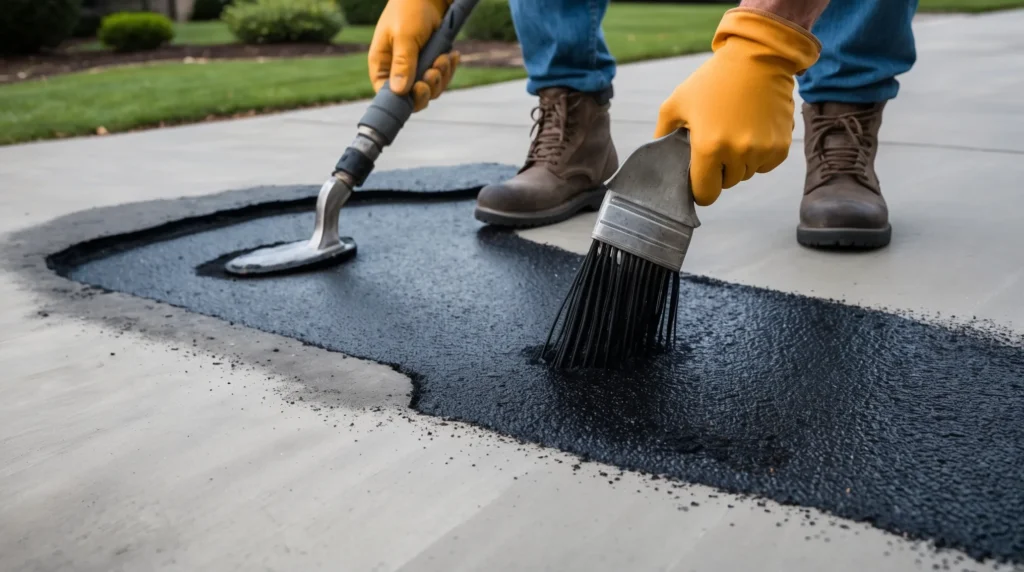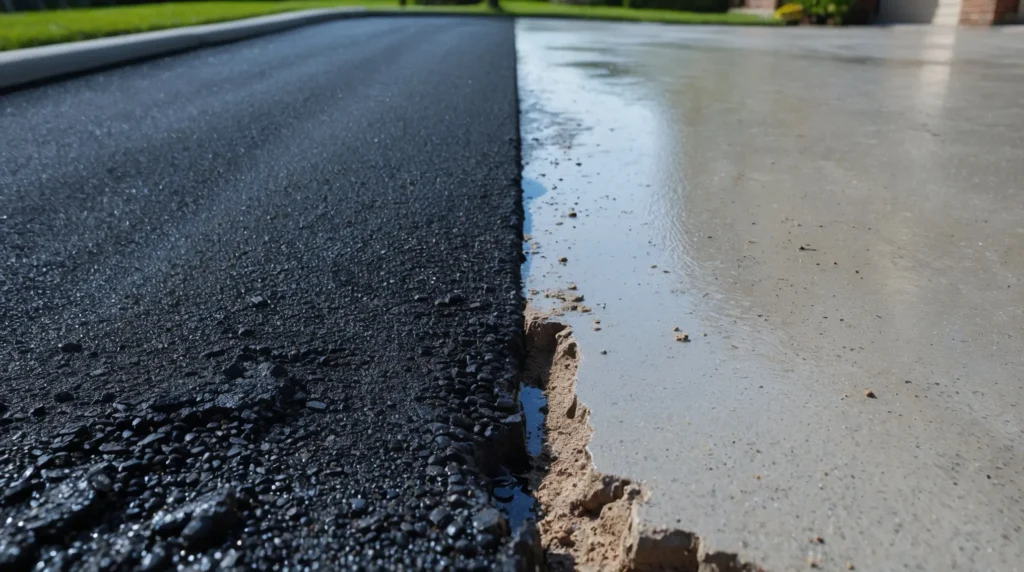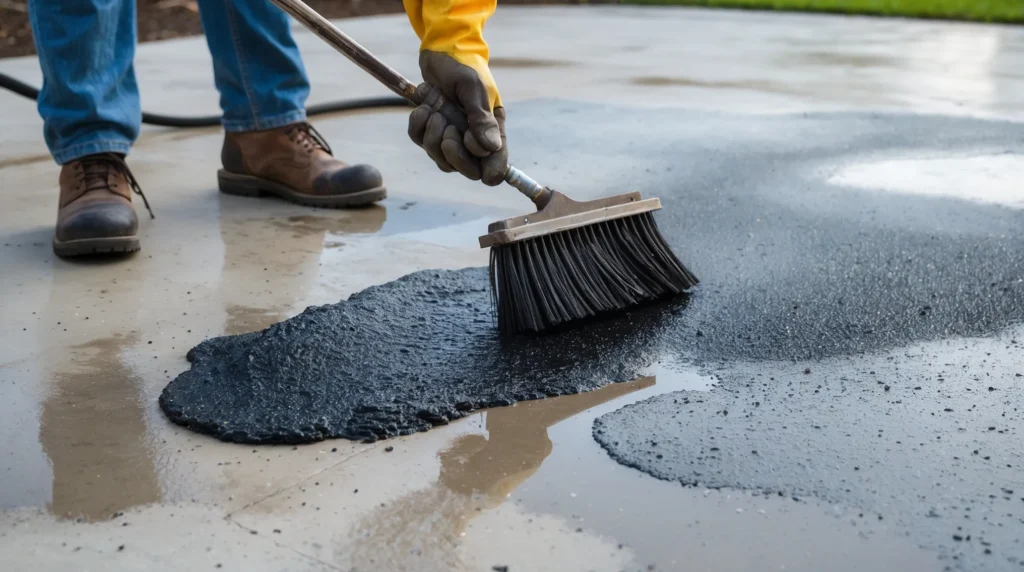Many homeowners ask, Can you use asphalt sealer on concrete? The quick and clear answer is no. Asphalt sealer is made to protect asphalt surfaces, not concrete. When placed on concrete, it does not bond, it peels away, and it fails to protect the surface. In this article, we’ll explore why asphalt sealer is not right for concrete, what happens when people try it, what better options exist for sealing concrete driveways, and how to fix problems if asphalt sealer has already been applied. By the end, you will know how to protect your concrete driveway the correct way and avoid common mistakes.
Understanding the Basics: Asphalt Sealer vs. Concrete Surfaces

At first glance, asphalt and concrete may look similar. Both are used for driveways, sidewalks, and parking lots, and both need protection from weather, water, and traffic. But the way they are built and the way they age are very different. Asphalt is a mixture of stones held together with liquid asphalt binder, which is flexible. Concrete, on the other hand, is a mix of cement, sand, gravel, and water, and once cured, it becomes hard, rigid, and porous.
Because of these differences, the products used to seal and protect them are not interchangeable. Asphalt sealers are designed to coat a soft, flexible surface and provide a protective layer that blocks sunlight, water, and oil from breaking down the pavement. Concrete sealers, by contrast, are made to penetrate the pores of the cement or create a hard film on the surface to resist water, salt, and stains. The chemistry is different, the bonding is different, and the result is different. Understanding this distinction is the key to knowing why asphalt sealer cannot do its job on concrete.
Why Homeowners Consider Using Asphalt Sealer on Concrete Driveways
It’s not uncommon for homeowners to think about using asphalt sealer on concrete. There are several reasons for this. Sometimes it is a matter of cost and convenience. Asphalt sealer, often called blacktop sealer, is widely available in hardware stores, usually sold in large buckets. It is marketed as an easy do-it-yourself option, with simple tools like rollers or sprayers. For someone with a concrete driveway, the thought may be, “Why not just use this product since it’s right here and cheaper than other sealers?”
Another reason is misunderstanding. Many people do not know there is a difference between asphalt and concrete sealers. To the eye, both surfaces can look similar, so it feels natural to assume the products can be shared. Homeowners may also hope for a quick fix. Concrete can get stains, cracks, and fading over time, and when faced with these problems, some think that asphalt sealer is an easy solution to make the surface look fresh again.
The reality, however, is that this choice does not work and often creates more problems than it solves.
Can You Use Asphalt Sealer on Concrete? The Straight Answer
The straightforward answer to this important question is no. Asphalt sealer is not designed for concrete, and it does not provide the protection you are hoping for. Asphalt is softer and more flexible than concrete, so the sealer is formulated to move with that flexibility. Concrete, however, is rigid and porous. When asphalt sealer is applied to it, the material sits on the surface. This lack of bonding means that after a short time, the asphalt sealer begins to peel away. It can leave dark, patchy areas, and it does nothing to keep water or chemicals from penetrating the concrete. In fact, in some cases, asphalt sealer can trap moisture in the concrete, which may cause further damage during freeze-thaw cycles.
So if you are asking, can you put asphalt sealer over concrete, or can you use blacktop sealer on concrete, the professional answer is the same: you should not.
Asphalt Sealer on Concrete: What Happens If You Try It

Many people who apply asphalt sealer on concrete notice the problems within a year. The first issue is poor bonding. Concrete has a smooth surface with small pores, but asphalt sealer is not designed to penetrate them. Instead, the sealer forms a weak film that begins to separate. This separation leads to peeling and cracking, especially in areas with heavy traffic or exposure to weather. Another problem is trapped moisture. Concrete needs to breathe, which means water vapor naturally moves in and out of its pores. When you cover it with asphalt sealer, the moisture gets trapped. In warm months, this can cause bubbles under the sealer. In cold months, the water freezes and expands, leading to cracks in the driveway.
Visually, the surface may also look uneven. Asphalt sealer is black, so when applied to light gray concrete, it often dries blotchy and streaked. What was intended to look like a new protective coat can quickly appear like a failed project. At the end of the day, money spent on asphalt sealer for concrete is wasted because the product was never designed for that purpose.
Blacktop Sealer on Concrete: Is It Any Different?
Some people wonder if blacktop sealer is any better than asphalt sealer when it comes to concrete. In truth, the terms are often used interchangeably. Blacktop is another word for asphalt pavement, so blacktop sealer is simply asphalt sealer under a different name. The results are the same: poor bonding, peeling, cracking, and staining.
Using blacktop sealer on concrete will not solve the problem, nor will it extend the life of your driveway. Instead, it creates the same headaches. The surface may turn a darker shade, but the protection does not last. Whether you call it asphalt sealer or blacktop sealer, concrete is not the right surface for either product.
Sealcoating Concrete Driveways: What You Should Know
The good news is that concrete driveways can and should be sealed, but with the right products. Sealcoating concrete driveways is a common practice, but it requires sealers made for cement. These products are designed to either soak into the surface or form a strong film that bonds well. Acrylic sealers add shine and protect against water and stains. Epoxy sealers create a tough, chemical-resistant surface that works well in areas exposed to oil or salt. Some homeowners use tar sealer for concrete, but this is more common in industrial settings than residential driveways. The key point is that concrete needs a product made for concrete. Seal coat concrete driveway products are very different from asphalt coatings, and they are the only way to get true, lasting protection.
Concrete Driveway Sealcoating vs. Asphalt Sealcoating

To understand why the wrong product fails, it helps to compare the two processes. Asphalt sealcoating is applied to restore the black appearance of the pavement, to block sunlight from drying out the binder, and to keep water and oil from entering the surface. It works by creating a thin but flexible layer that refreshes the pavement and slows down wear. Concrete driveway sealing is different. Concrete sealers are often penetrating, meaning they soak into the pores of the cement and create a barrier inside the material. Some are film-forming, but these products bond in a way that works with the rigidity of concrete. They do not add flexibility, because concrete does not flex. Instead, they add hardness and chemical resistance.
When you mix up the two and use asphalt pavement sealer on concrete pavement, you get poor results. Each type of driveway needs its own kind of care.
Alternatives to Asphalt Sealer: Best Options for Concrete Driveways
For homeowners looking to protect their concrete driveways, the best approach is to use products designed for the job. Acrylic sealers are popular because they are easy to apply, dry quickly, and leave a nice finish. They help resist water and stains while enhancing the color of the surface. Epoxy concrete driveway sealer is another strong choice. It creates a durable, chemical-resistant layer that lasts a long time, especially in areas exposed to oil drips or road salt. Penetrating sealers are excellent if you want protection without changing the look of your driveway. These products soak into the pores and block water from getting inside. Cement driveway coatings can also be used if you want to add a protective top layer that improves both appearance and performance. These alternatives are far better than using asphalt sealer on concrete because they actually bond, protect, and last.
How to Remove Asphalt Sealer from Concrete If Already Applied

What if the mistake has already been made? If asphalt sealer has been applied to concrete, it can be removed, though it may take effort. The process usually starts with scraping or brushing off any loose pieces of sealer. After that, a solvent or cleaner made for asphalt removal is used to break down the coating. The surface is then washed with a pressure washer to clear away the residue.
Depending on how much sealer was applied and how long it has been there, the process may need to be repeated more than once. Once the asphalt sealer is removed, you can then choose the correct concrete sealing driveway product to protect the surface properly. While this cleanup can be time-consuming, it is the only way to fix the issue and restore the concrete for proper sealing.
Professional Advice: Choosing the Right Driveway Sealer in Greenville, SC
Climate also plays a role in driveway care. In places like Greenville, SC, driveways face hot sun, heavy rain, and occasional ice during winter. These conditions demand a sealer that can handle moisture, temperature changes, and wear. This is where professional guidance matters.
At KW Asphalt, we help homeowners understand the difference between asphalt and concrete sealing. We explain why asphalt-to-concrete joint sealant is different from full driveway sealing, and we recommend products that fit the local climate. Using the right material ensures your driveway lasts longer and looks better. Trying to save money with the wrong sealer almost always ends up costing more in repairs later.
Final Thoughts: Protecting Your Concrete Driveway the Right Way
To conclude, the question you can use asphalt sealer on concrete has a clear answer: no, you should not. Asphalt sealer is made for asphalt driveways and parking lots. It does not bond with concrete; it peels away, and it fails to provide protection. The right way to care for concrete is to use sealers designed for cement, such as acrylic, epoxy, penetrating sealers, or cement driveway coatings. These products bond properly, protect the surface, and give you the long-term results you want.
At KW Asphalt, we have seen the problems caused by the wrong product, and we always guide our clients toward the best solution for their specific driveway. If you want lasting results, it is always worth using the correct sealer for the correct surface.
If your driveway needs sealing, reach out today to learn about the right options. Protect your investment with the right products and advice, and enjoy a driveway that looks good and performs well for years to come.
